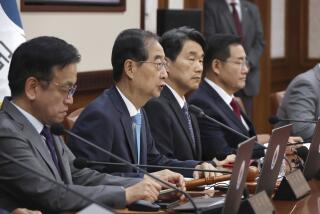Koreas Agree to Reunions, Not Military Talks
- Share via
SEOUL — North and South Korea agreed Wednesday to another round of cross-border reunions between separated family members and to a busy fall schedule of cultural and sporting events. But efforts to set up a meeting between the two nations’ military officials failed.
The results of three-day Cabinet-level talks at a hotel here were relatively modest, given expectations that the negotiations would lead to a breakthrough in relations.
South Korean officials had hoped that the North’s military would agree to security talks needed before a railroad can be built to reconnect the divided peninsula through the demilitarized zone.
But despite last-minute wrangling, North Korean negotiators would go no further than pledging that they would recommend a meeting between military officials.
“That was the best we could get under the circumstances,” said Kim Jung Ro, a spokesman for the South’s negotiating team. The South Koreans nevertheless considered this latest round of talks “a breakthrough in that relations are back on track and we have fixed the schedules for many special events over the year,” he said.
The family reunions are to take place over one week during Chuseok, the Korean Thanksgiving holiday, which begins Sept. 14. As with the last round of reunions in spring, the site is to be the North Korean resort of Mt. Kumgang.
Talks under the auspices of the Red Cross also are to take place next month, in an effort to designate a permanent place for Koreans wanting to meet relatives who live across the border.
More Talks Scheduled
In addition, a crowded schedule for upcoming events includes economic cooperation talks later this month and negotiations over tourism next month. The next round of Cabinet-level meetings is to be held Oct. 19-22 in the North Korean capital, Pyongyang.
On the sporting scene, teams from the two nations are to square off Sept. 7 in a friendly soccer match, their first in more than a decade.
North Korea also has promised to send athletes to participate in the Asian Games, which are being held Sept. 29-Oct. 14 in the South Korean city of Pusan. As part of Wednesday’s deal, the countries agreed to an exchange of taekwondo teams.
Also Wednesday, a delegation of more than 100 North Koreans arrived in Seoul to jointly celebrate Korean Liberation Day, a holiday observed on both sides to mark Aug. 15, 1945, the end of Japan’s 35-year occupation of the peninsula.
The North Koreans--the women dressed in colorful holiday robes and the men sporting pictures of North Korean founder Kim Il Sung on their lapels--were treated to a traditional music performance by South Korean entertainers.
Despite the flurry of activity, many Korea watchers believe that relations remain at an impasse on fundamental issues. It has been less than two months since a naval clash between the nations left at least four South Korean sailors dead, and the fact that the North Korean military is resisting a meeting with its Southern counterpart shows that distrust remains high.
Observer Sees a Lack
Scott Snyder, Seoul representative for the Asia Foundation, a San Francisco-based think tank, said none of the measures agreed to Wednesday “addresses the core issue of reducing tension on the peninsula.”
“Talking is better than not talking,” he said. “Meeting is better than not meeting. But it is no substitute for action.”
The reconnecting of the railway links that have remained severed since the 1950-53 Korean War was one of the most important pledges to come out of the landmark visit in June 2000 of South Korean President Kim Dae Jung to Pyongyang. But because the line would run through the demilitarized zone, said to be the most heavily fortified border in the world, work cannot be completed without guarantees from both armies for workers’ safety.
Kim, who leaves office early next year, badly wants the railroad completed during his term. Smooth relations with North Korea in the coming months also are widely seen as essential if his party’s candidate is to prevail in the Dec. 19 presidential election.
This latest round of talks was the seventh Cabinet-level negotiation since the 2000 summit. Most sessions have produced only vague pledges that have quickly unraveled. But the stakes were higher this time around because of the impending election.
Meanwhile, North Korea is in the process of overhauling its obsolete system of food distribution and pricing, raising speculation that economic reforms could be parlayed into diplomatic openness.
North Korean Foreign Minister Paek Nam Sun recently sought out U.S. Secretary of State Colin L. Powell at an Assn. of Southeast Asian Nations regional forum in Brunei. The State Department is mulling whether to send an envoy to Pyongyang and will no doubt look to these latest talks on the peninsula for clues as to whether North Korea is ready to move in earnest.
More to Read
Sign up for Essential California
The most important California stories and recommendations in your inbox every morning.
You may occasionally receive promotional content from the Los Angeles Times.













